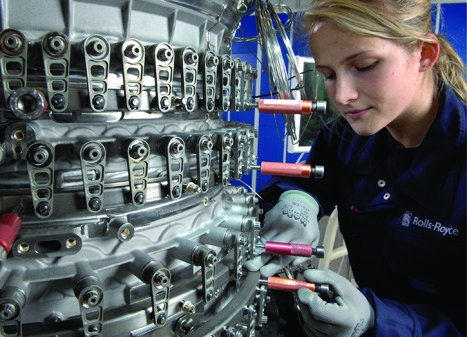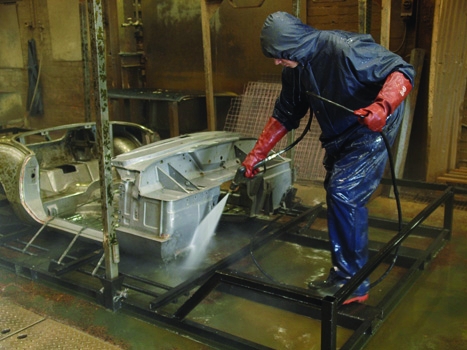The automotive industry of the 1970s was a symbol of Britain’s decline. Poor labour relations, bad governance and a lack of investment gave engineers very little to look forward to and a once great sector struggled as foreign competitors gained a larger share of the market.
Today, in the middle of another recession, industry leaders are adamant that the same mistakes will not be made again. Despite recent setbacks, they claim that the push towards low-carbon vehicles, new materials and advanced manufacturing techniques is making the automotive industry a far more exciting and lucrative place to work in.

According to Paul Everitt, chief executive of the Society of Motor Manufacturers and Traders (SMMT), the changing face of the industry is bringing a whole host of exciting opportunities for new and experienced engineers. But judging from recent headlines about poor UK car sales, many heading for a career in the sector would be forgiven for thinking otherwise.
Earlier this month, the SMMT published lacklustre figures of UK new-car registrations in September, which were down 0.8 per cent on the same month in 2010. The outlook remains uncertain given weakening economic growth combined with the volatile global financial markets, said the industry body. The SMMT forecasts the 2011 market to decline further in quarter four and end 2011 at 1.92 million units.
Many hope the market will recover in 2012 and when it does, talented and qualified engineers will be in high demand
Engineers need to look to the longer-term future of the automotive industry, claims Dr Martin Passmore, head of Loughborough University’s Aeronautical and Automotive Engineering Department. Many hope the market will recover in 2012 and when it does, talented and qualified engineers will be in high demand. In fact, a number of automotive companies are already stepping up their recruitment despite the recession.
In September 2011, Jaguar Land Rover made a £355m investment in a new facility in the Midlands to manufacture low-emission engines, creating 750 jobs. The group said graduate recruits will join its training programme to develop technical and engineering expertise. In August, MIRA, the advanced engineering, research and testing facility, was awarded Enterprise Zone status, creating more than 2,000 jobs over the next 10 years.
But Passmore is concerned that there are not enough good engineers to fill these roles. ’My experience is that many companies cannot recruit enough high-quality graduates,’ he said. ’I say this because I have certainly been approached by more than one car company asking how they can attract our students.’
Currently, around 40 per cent of workers in the automotive sector are aged over 45. The next 20 years will see many of these people retiring, suggesting a buoyant recruitment market.

Philippa Oldham, head of transport at the Institution of Mechanical Engineers (IMechE), believes that despite the range of opportunities in the automotive industry, more needs to be done to change the perception of the sector. ’Graduate engineers appeal to many employers, including those who are not in the engineering business, because of their numeracy, analytical mindset, problem-solving skills and adaptability,’ said Oldham. ’There is plenty of competition and demand for their skills, and there may well be more in the future. The automotive sector will need to compete for good graduates. Highlighting technology challenges will help attract engineers as will the ability to help shape an important industry for a new future.’
“The challenges mean there couldn’t be a better time to be an automotive engineer”
DR MARTIN PASSMORE
As the problems of an ageing population persist, there will be the need to manufacture a variety of vehicle types alongside a continued emphasis on eliminating emissions. The next decade is also likely to see the development of a more integrated transport network and intelligent transport systems. ’In my view, there couldn’t be a better time to be an automotive engineer because there are great challenges,’ said Passmore. ’People working in the automotive sector will find themselves working with engineers from a wider range of disciplines and will have to communicate with many new specialists.’
The automotive sector is still the UK’s number-one export manufacturer. In 2010, the UK exported more than £27bn of vehicles and parts. Of the 1.39m vehicles made in the UK, 75 per cent of the cars and 73 per cent per cent of the commercial vehicles were exported. Britain is now also one of the leading locations for engine production with 2.4m units were made in the UK last year, of which 72 per cent were sold overseas. The sector is worth more than £11bn to the economy.
With these figures, convincing engineers to follow a career in the sector shouldn’t be hard. But filling the skills gap is likely to continue being a challenge.
Delta Motorsport
race and road
Delta is seeking to recruit a senior design engineer, among other rolesSilverstone-based engineering consultancy Delta Motorsport is on the lookout for a senior design engineer, composites design engineers, mechanical design engineers and an electrical systems integration engineer.
According to Delta’s technical director, Nick Carpenter, successful applicants will be working on a variety of in-house and external consultancy projects in the race and road car sectors.
With Delta also supporting a number of race series, he added that there could be opportunities for those keen to experience the high-pressure world of motorsport. Carpenter said that the firm is looking for bright, enthusiastic engineers with a relevant degree and, for the design roles, some experience with Catia Version 5.
According to Carpenter, it’s an exciting time to join a small but growing company. ’Having invested in the design and build of our own electric passenger car, the E-4 Coupe, Delta has now secured a number of research, design and development projects in the fields of composite materials and automotive electrical systems integration, and is expanding to be able to meet this demand.’
He added that private medical cover is provided, and training offered as necessary (for example, in modules of Catia). Flexible working will be considered if this can be accommodated with a particular role.
TRW
the right steer
Company looks for expertise in steering and braking systemsTier-one automotive supplier TRW currently has a range of positions available in all aspects of automotive design and development.
The company is specifically looking for people with expertise in the development of steering systems and components, embedded software engineers, software systems engineers and people with braking systems and applications experience.
TRW’s resourcing manager Rebecca Austin said that all roles require applicants to have a degree in an engineering subject, as well as significant relevant experience.
The posts are based at the firm’s technical centre in Solihull, West Midlands, with many of the positions offering the opportunity to travel to other TRW sites in Germany, the US and China.
’TRW designs, develops and manufactures cognitive safety systems for all of the world’s leading vehicle manufacturers,’ said Austin. ’Our products range from braking and steering systems to advanced driver assist and occupant safety systems.’
Salary levels are competitive and dependent upon the role and applicant experience. The company also offers a pension scheme, medical and dental healthcare, and life assurance.
Jaguar Land Rover
Jaguar Land Rover, the UK’s largest manufacturer of premium vehicles, and one of its biggest employers of automotive engineers, is looking for an unprecedented number of high-calibre individuals for professional and managerial roles in product development, manufacturing purchasing and quality.
According to recruitment manager Steph Stephenson, it represents an exciting opportunity to join a company with bold ambitions for the future. ’Jaguar Land Rover is embarking on an incredible growth programme that will see it deliver 40 significant product actions over the next five years thanks to a multi-billion-pound investment in product creation,’ she said. ’As such it really is the ultimate destination for anyone wanting a career in the automotive industry, or wishing to work for a progressive and globally regarded organisation.’
While a degree in engineering or a relevant discipline is essential, Stephenson stressed that the firm is keen to hear from those with transferable skills who might not have previously considered the automotive industry.
Detailing the firm’s ambitious plans for the future, Stephenson said: ’For at least the next five years, we’ll spend around £1.5bn annually on product creation keeping more than 4,000 engineers and designers very busy. We’ll also accelerate innovation thanks to a £100m investment in an advanced research facility at Warwick Manufacturing Group.’
Roles are UK based but there will be opportunities for international travel and assignments. ’We offer highly competitive salary packages, performance-related pay, a competitive pension plan, 26 days’ annual holiday and a selection of family-friendly/flexible-working policies.’
The company also provides a range of development opportunities, including support for technical and professional academic programmes, and training for specific job-related requirements.




Glasgow trial explores AR cues for autonomous road safety
They've ploughed into a few vulnerable road users in the past. Making that less likely will make it spectacularly easy to stop the traffic for...